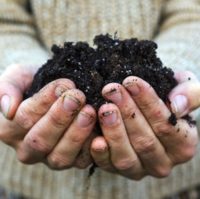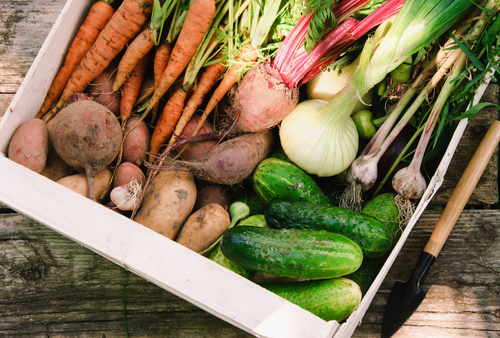Judging by the obvious lack of seedlings and seeds in our stores, it seems that everyone has now taken a great interest in growing their own food which is very pleasing to me as both an avid gardener, farmer and nutritionist rolled into one! So, to help you along with your new journey into growing food I share with you some tips I have learnt from making all the mistakes.
To produce healthy strong nutrient dense food, one must start with good foundations.
Firstly, pick your spot. It doesn’t matter if you are planting in pots, in boxes, in the ground or raised garden beds, plants need sunlight to thrive. Choose a sight which will provide 6 hours of sunlight per day preferably the first 6 hours of the day.
Just like us, plants need good food to thrive so ensuring you provide the best possible base to grow in is essential.

Good food needs good foundations
I use a combination of the soil I have, Rocky Point ActivGrow, Earthlife Veggie Mate rock minerals and cover the mix with Rocky Point Sugar Cane Mulch. The mulch provides shelter for emerging seeds and seedlings as well as the all-important microbes and worms, retains moisture, aids temperature control and suppresses weed growth. If you are developing a garden on the ground, start with a thick layer of cardboard or newspaper beneath to suppress grass and weed growth.
Again, just like us, plants need water so ensure you have a convenient watering system set up. Bos Rural at the Kandanga Farm Store can help you design a system right for you.
You can choose to stand and water your garden (good for the soul) or set up a dripper or sprinkler system (automated on a timer or requires you to turn the tap on – and remember to turn it off!)

A bit of planning around watering will save you and your seedlings
Now, decide how much you would like to grow. This is dependent on how many in your household, the time you can commit to the garden, availability of water, size of the area you have and of course your likes and dislikes. A busy person not at home much might decide just growing herbs is helpful to provide a variety of flavours to different meals. Someone who is home and loves to ‘potter’ in the morning might like to grow a variety of quick growing plants (leafy greens) as well as staples like potatoes, broccoli and beans. I recommend stick to a few varieties to start until you get the hang of growing food then expand your choices.
Now you are ready to begin planting! Right now I recommend a variety of leafy greens to make up a salad mix, as well as rocket and kale. The Asian greens such as tatsoi and bok choy are quick growing and highly nutritious and if you just harvest the leaves the plants will keep on giving. For later harvesting, plant broccoli, beans, (bush beans require less space, climbing beans require a trellis), eggplant and cauliflower. Successive planting is important to maintain a constant supply, so each week plant a few more seedlings or seeds to keep the momentum going. If you use heirloom varieties, let the strongest healthiest plant go to seed and collect the seeds for next years planting.
Flowers in your garden are important to attract the bees and beneficial insects. I recommend zinnias, dahlias and marigolds. Plant them among your vegetables, not only will they work hard for you they are wonderful cut flowers to brighten up your house.
Happy gardening!
Victoria
